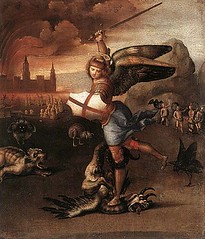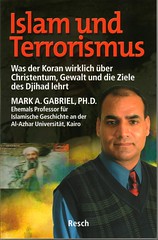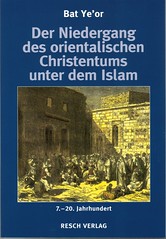July 26 2009 Maidugiri, Yobe, Bauchi, Kano, (Northern Nigeria) Radical Islamic fundamentalist sect, Boko Haram [translated “Western civilization is evil”] goes on rampage burning churches, and looting homes belonging to Christians and murdering them. Three Christian pastors including George Orji (Igbo) were killed by beheading. Officially 800 people were reported killed.
2007, Adamawa (Northern Nigeria) Moslem jihadists invade Christian community of Yugor killing hundreds of Christians, looting and burning churches and Christian’s homes and property.
2006 Maidugiri, (Northern Nigeria) Islamic fundamentalists protesting cartoon of Prophet Mohammed by Danish cartoonist killed hundreds of Christians, burned down scores of Churches, and looted shops and homes belonging to Christians.
2006 All over Northern Nigeria. Similar riots by Islamic jihadists were held in numerous towns in Northern Nigeria – Katsina, Bauchi, Minna, Potiskum, Kano, Kotangora. Thousands of Christians were killed, scores of churches were looted and burned and personal homes and businesses of Christians were looted and burned. One week before that Nigerian MP’s burned Danish and Norwegian flags in the parliament premises.
June 28 2006, Abuja (Northern Nigeria) The Federal government of Nigeria accused Kano State of Northern Nigeria of collaborating with foreign powers to train 100 Muslim militants in “intelligence gathering” and the "practice of jihad". In a news release, Information Minister Frank Nweke said the "Hisbah", a group employed by the mainly Muslim state of Kano to enforce sharia law, was "a parallel security outfit that poses a potential threat to national security".
April 2003, Kano (Northern Nigeria) Islamic jihadists go on a rampage A pastor, Sunday Madumere (Igbo) and six of his family members were killed.
April, 2003, Jos (Northern Nigeria) Armed Muslim insurgents attacked Wereng village near Vom a suburb of Jos killing people, burning homes and looting people’s property.
April, 2003, Langtang (Northern Nigeria) A group of armed Muslims attacked a village in Langtang killing people and burning down homes.
2003 Gusau (Northern Nigeria) Governor Ahmed Sani, who came to the United States and used the VOA to advertise the introduction of fundamentalist Islamic Sharia Law in Nigeria promising that it will never be applied to Christians gave an order that more than 20 of the Christian churches in the State be demolished. They were demolished promptly. No reasons were given.
March, 2003 Jos (Northern Nigeria) Thousands of jihad warriors attacked the town of Kardako in Wase Local Government Area (LGA) shouting “Allahu Akbar” killing Christians and burning down homes.
February, 2003 Ibadan (Western Nigeria) Muslims jihadists from the National Council of Muslim Youth Organizations attacked Christian schools in Ibadan in an effort to force the schools to require women to wear Islamic head coverings. Hundreds of students and teachers were injured in the attack.
December 26, 2002, Bauchi, (Northern Nigeria) Islamic jihadists attacked Christians concluding a Christmas celebration in Bauchi killing Christians, looting and burning churches and Christian’s homes.
December 2002, Jos, (Northern Nigeria). Muslim Jihadists attack Christians. During the attack Rev. Bitrus Manjang, his son, daughter-in- law and their six-month old child were shot to death outside their home. The jihadists went on killing people looting and burning churches and Christian’s homes.
November, 2002 Kano, Kaduna (Northern Nigeria) Muslim jihadists went on a rampage after an article in the This Day newspaper suggested that the prophet Muhammad would probably have married a contestant from the Miss World pageant scheduled to be held in Abuja. Muslim mobs ransacked the newspaper’s office, issued a fatwa on the author of the article, Miss Isioma, killed Christians and burned down numerous churches.
October 2002, Jos, (Northern Nigeria) Hundreds of Christians were killed when a mob of several Muslims jihadists attacked the town of Fajul in Plateau State. Mercenaries from Chad and Niger were believed to be among the group, which burned down homes, churches, and raped several women.
September 11, 2002, Jos, (Northern Nigeria) A bomb exploded at the Church of Christ in the Laranto suburb of Jos. No one was injured, but there was some structural damage to the church building.
August 2002 Kano, (Northern Nigeria) The government of Kano State ordered half of the churches in Kano State closed because of Muslim complaints about “too many churches.”
June 2002, Jos, (Northern Nigeria) Several Christian communities in Plateau state including Yelwa, Shendam, Wase, Barakin Ladi, Vom and Miango were invaded by Islamic jihadists who killed people and burned down homes and churches.
June, 2002, Minna, (Northern Nigeria) At least 75 Christians were arrested in Niger state for opposing the state’s Islamic sharia law.
April 8-22, 2002, Kano (Northern Nigeria) At least seven churches in Kano State were destroyed by authorities. There is a growing trend in states that have enacted Sharia law to destroy Christian churches on the pretense that the churches have violated building codes. Christians believe it is a step toward wiping out the Christian faith in northern Nigeria.
April 2002, Sokoto (Northern Nigeria) Two Christians in Zamfara State were tried on the charge of apostasy, converting from Islam to Christianity. According to Islamic law, the penalty for apostasy is death. However the two Christians, Lawali Yakubu and Ali Jafaru, claim they were never Muslims to start with. The two belong to an ethnic group that has practiced Christianity for many years.
February, 2002 Ilorin (Northern Nigeria) Muslims in Ilorin turned violent while celebrating Eid-el-Kabir and began attacking and killing Christians and burning their houses and businesses.
February 2002, Kano (Northern Nigeria) The Kano state government revealed that it had closed down 122 Christian schools for failing to meet state requirements. The requirement in question is the compulsory study of Islam. Christian schools have refused to allow Muslim clerics into their schools, thus risking closure.
February, 2002, Gombe, (Northern Nigeria) A Christian lady, Esther Bulus was kidnapped from her school by four Muslims who slit her throat and left her to die. Esther had refused to marry a Muslim politician in Gombe on grounds of religious differences. She was murdered because of this.
December 30, 2001, Jos, (Northern Nigeria) Armed Muslim jihadists attacked the Christian community in southern Jos, killing people, looting and destroying property worth several million dollars.
December 2001, Yola (Northern Nigeria) Muslim army soldiers from the 23rd Armored 7th Brigade in Yola, burned a Christian church building, which was constructed in the army barracks. They justified the act by saying it was an illegal structure. However, the army officially allows both Islam and Christianity to be practiced in the barracks.
December 10, 2001, Kano, (Northern Nigeria) Truck driver Uche Nwama was killed by Islamic jihadists for allowing the exhaust from his truck to drift into an open-air Islamic meeting. Islamic jihadists claimed the exhaust had desecrated the Quran.
November 6 2001; Ibadan (Western Nigeria) Islamic jihadists hold a massive rally in Ibadan in support of Osama Bin Laden and his attack and slaughter of thousands of Americans during the 9/11/2001 terrorist attack on the World Trade Center in New York. They condemn the United States for attacking the Taliban in Afghanistan and vow to fight alongside Bin Laden and his fellow terrorists.
November 2001 (Northern and Western Nigeria) Islamic jihadists hold massive rallies in Osogbo, Sokoto, Kano, Zaria, Kaduna, and other towns in Western and Northern Nigeria in support of Osama Bin Laden and his attack and slaughter of thousands of Americans during 9/11/2001 terrorist attack on the World Trade Center in New York. They condemn the United States for attacking the Taliban in Afghanistan. They also vow to fight alongside Bin Laden and his fellow terrorists in a jihad against America.
November 28, 2001 Enugu (Eastern Nigeria) Christian Biafrans organize a peaceful rally in Enugu in solidarity with and support of the government and people of the United States over the terrorist attack in New York on 9/11/2001 and in support of the United States action against the terrorists. The Nigerian paramilitary police brutalized the participants, disbanded the rally and arrested the leaders.
October 14-18, 2001 Kano (Northern Nigeria) Massive anti-American protests in Kano by Islamic jihadists. Thousands of Christians are slaughtered and scores of churches are burned. Property of Christians worth billions of dollars are looted and destroyed.
October 2001, Kaduna (Northern Nigeria) Islamic jihadists attack Christians in churches, on the street and in their homes. Thousands of Christians are slaughtered, scores of churches are burned and looted, and thousands of Christian homes are looted, and burned.
September 2001, Kano (Northern Nigeria) Islamic jihadists attack Christians burning down churches slaughtering thousands of people, looting churches and private homes. Kano State government demolishes the few remaining churches.
September 2001, Jos (Northern Nigeria) In a well planned and highly coordinated program Islamic jihadists attack Christians in the city of Jos, burning down churches, and private homes of Christians, looting the churches and private property of Christians. Hundreds of churches were burned and thousands of Christians were slaughtered some burned while worshipping in their churches.
August 2001, Bauchi, (Northern Nigeria). The Bauchi state government is alleged to be using Muslim mercenaries to attack Christians in the Tafawa Balewa and Bogora districts. On several occasions vehicles loaded with Islamic jihadists were intercepted by vigilant Christians. Several hundred Christians were killed and houses, shops and churches looted, burned and destroyed.
June 2001, Gawaram (Northern Nigeria) Islamic jihadists attack Christians, burn down dozens of churches and kill Christians.
February 24-25, 2001, (Gombe) A visit to Gombe state by an Israeli ambassador sparked a riot by Islamic jihadists. During the riot the jihadists kill Christians, loot and burn down churches, loot and burn down Christian homes and render thousands of people homeless. The Calvary Baptist Church and the Bishara Baptist church are among those looted and burned.
September 2000 Gombe (Northern Nigeria) In Bambam, Gombe state Islamic jihadists attack and kill Christians, burn down and loot churches and private homes and businesses of Christians.
May 2000, Kaduna (Northern Nigeria) For several days Islamic jihadists attack and slaughter hundreds of people in Kaduna.. They loot thousands of Christian people’s homes, churches, businesses and then burn them down. Thousands of Christians are mindlessly slaughtered and more than 200 churches are burned.
February 2000, Kaduna (Northern Nigeria) Islamic jihadists attack and slaughter Christians opposing the implementation of Sharia law in Kaduna, northern Nigeria. Christian homes, businesses and churches are looted, and burned. Thousands of Christians are mercilessly slaughtered and property worth billions of dollars are looted and destroyed by the jihadists.
2000 Damboa, Maidugiri, (Northern Nigeria) Islamic jihadists attack and slaughter Christians, loot and burn Christian homes, businesses and churches.







